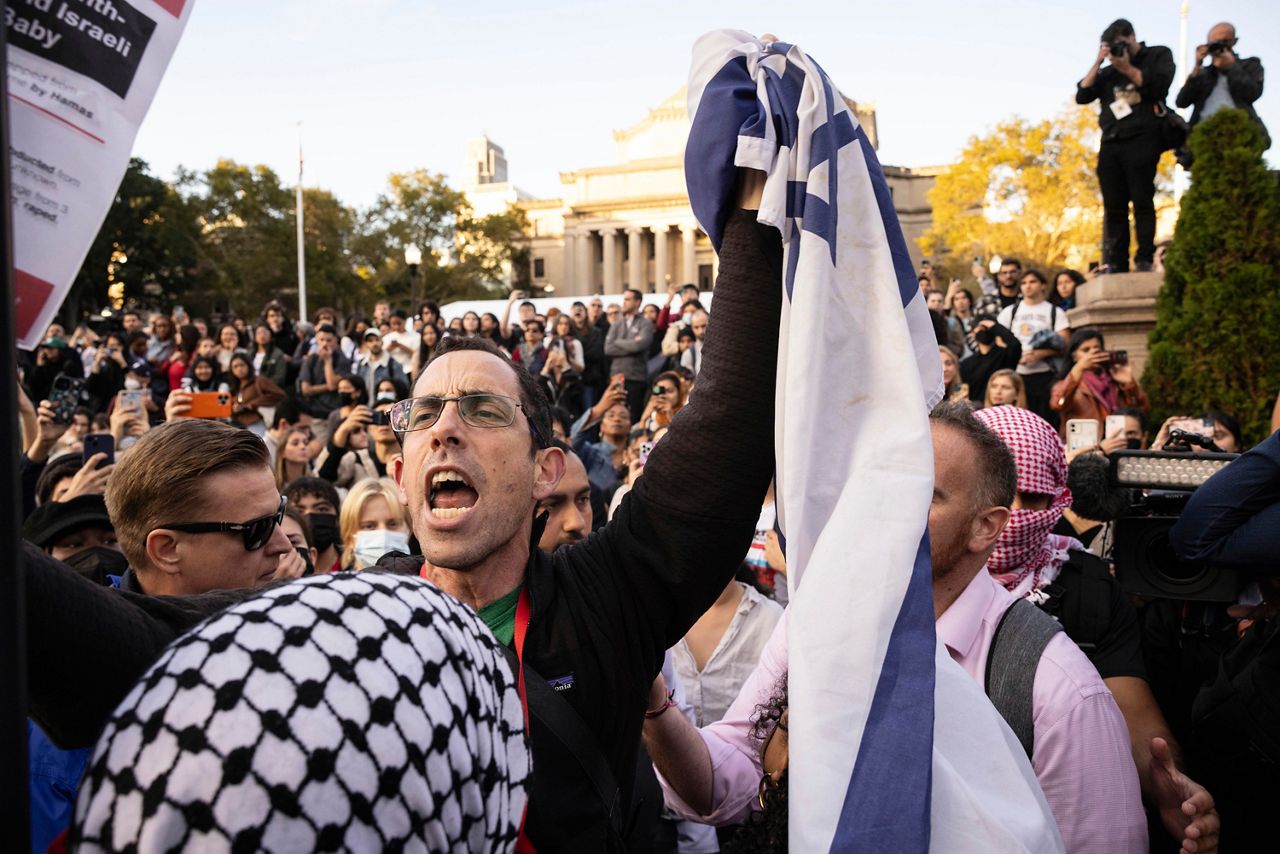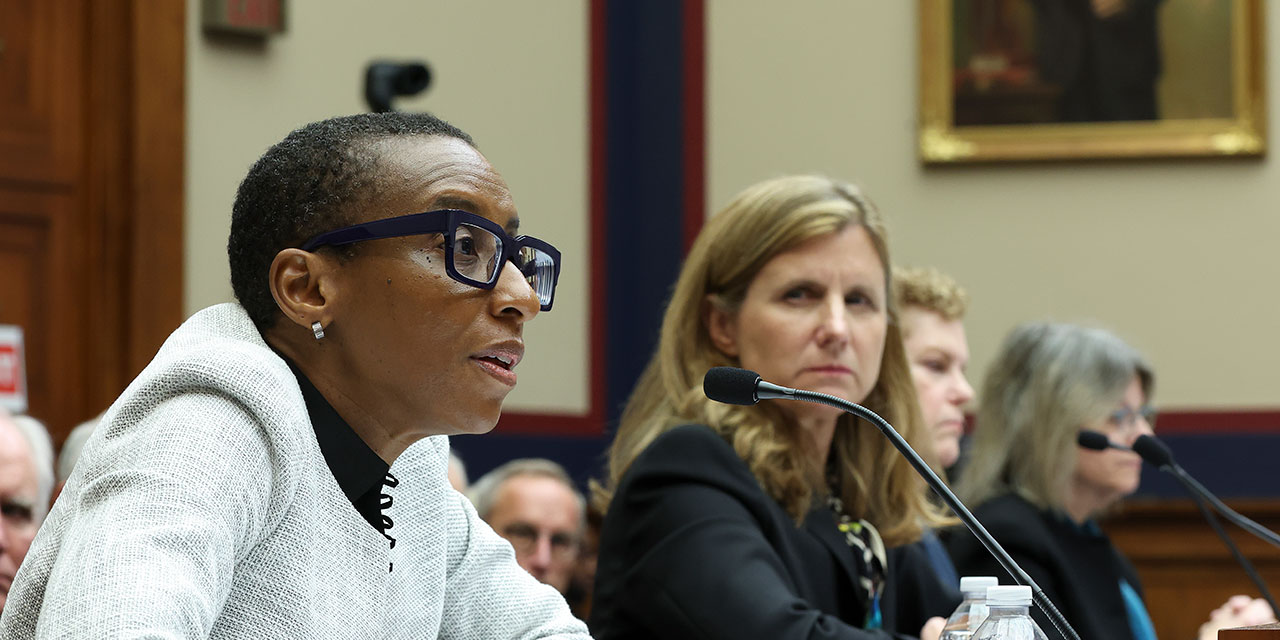Shortly after the militant group Hamas mounted a surprise attack killing 1,400 in Israel, the National Students for Justice in Palestine released a “toolkit” to help chapters across America organize a day of resistance on college campuses. Their materials called the rampage, in which the overwhelming number of dead were civilians and hundreds more were kidnapped to be held hostage, a “historic win for Palestinian resistance.”
That was a bridge too far for many conservatives who had long been distrustful of colleges and universities as progressive outposts indoctrinating the next generation with dangerously radical ideas. Florida Gov. Ron DeSantis – a 2024 presidential candidate who made a name for himself fanning the flames of the culture wars – ordered state universities to expunge the student group, accusing its members of illegally backing the Palestinian militants under a state law that makes it a felony to “knowingly provide material support” to U.S.-designated foreign terrorist organizations like Hamas.
College campuses have always been bastions of protest, where young, energetic students push older generations in the direction of the next social or political reform. But the war in Gaza has compounded distrust about and within the higher education community – with little prospect in sight for dissipating the toxic environment.
“This issue is one of the most heated and controversial issues on college campuses – not just now but in the recent past,” says Zach Greenberg, a senior program officer on the campus rights team at the Foundation for Individual Rights and Expression, or FIRE. “So when the conflicts flare up we see a lot of protest, a lot of advocacy, and then naturally a lot of pushback against that.”
Pro-Palestinian solidarity has crept from the far-left deeper into the mainstream in recent years, corresponding with an increasingly hard-line government in Israel and the rise of the Black Lives Matter movement in America. Public opinion has shifted among young, college-aged people who drive the push for social justice – rankling the Jewish community as well as political conservatives on the right for whom the U.S.-Israeli alliance is paramount. That dynamic set the tone for the responses to the Oct. 7 attacks.
Among the more noteworthy acts of advocacy, students at Harvard’s Graduate Students for Palestine and the Palestine Solidarity Committee publicized a now-infamous letter signed by more than two dozen other student groups in which they declared that they “hold the Israeli regime entirely responsible for all unfolding violence.” Students elsewhere have been filmed tearing down posters of Israelis taken hostage by Hamas. A handful projected anti-Israeli messages onto a library at George Washington University, including one that read “Glory to our Martyrs” and another that read “Divestment From Zionist Genocide Now.”
The outrage was as severe as the backlash was swift.
Other GOP presidential hopefuls followed DeSantis in an attempt to one-up each other: Former South Carolina Gov. Nikki Haley proposed stripping state funding or making it conditional based on how schools police hate on campus. South Carolina Sen. Tim Scott proposed rescinding Pell Grant funding for colleges and universities that refuse to condemn terrorism. Former President Donald Trump proposed revoking visas and deporting “radical anti-American and antisemitic foreigners” enrolled in institutions of higher education and dispatching Immigration and Customs Enforcement officers to monitor what he characterized as “pro-jihadist demonstrations.”
In one of the messiest fallouts, prestigious law firms, including Winston & Strawn and Davis Polk & Wardwell, rescinded job offers to law students at Harvard University and Columbia University who signed public statements supporting Palestinians in the wake of Hamas’ attack.
And in high-profile repudiations of decisions by elite schools to remain silent about the attack, the ensuing war and anti-Israeli statements made by students and faculty – a stance most institutions of higher education are advised to take and one known as “institutional neutrality” – major donors, including at Harvard and the University of Pennsylvania, announced pulling multimillion-dollar gifts.
Notably, the prevailing notions of the liberal bent of college campuses are not incorrect.
According to a 2023 survey by FIRE of roughly 1,500 four-year college professors, 50% identify as liberal, 17% as moderate, and 26% as conservative. But the survey also revealed that conservative professors feel stuck: They are more supportive of free speech and open inquiry compared to liberal professors, but fear that their ideas and beliefs will generate pushback and opposition – or even have professional consequences. And for that reason, 58% of them – almost three times as much as liberal professors – report that they regularly self-censor.
Though 15 years old, the most widely cited survey, called The Social and Political Views of American Professors, found that professors were 44% liberal, 46% moderate and 9% conservative. Some have argued that the disparities have accelerated in the time since. Or as Sarah Lawrence College politics professor Samuel Abrams wrote in an article for the opinion section of The New York Times in 2016 after studying ideology on campus, “It appears that a fairly liberal student body is being taught by a very liberal professoriate – and socialized by an incredibly liberal group of administrators.”
A significant trickle of college professors has walked back comments made expressing various degrees of support for Hamas after the attack, playing into the right-wing conspiracy theories alleging that far-left professors are radicalizing students and heightening polarization. And at Columbia University this week, dueling letters signed by hundreds of faculty members addressed the actions of some student activists who wrote in a statement that the “weight of responsibility for the war and casualties undeniably lies with the Israeli extremist government and other Western governments, including the U.S. government.”
“In our view, the student statement aims to recontextualize the events of October 7, 2023, pointing out that military operations and state violence did not begin that day, but rather it represented a military response by a people who had endured crushing and unrelenting state violence from an occupying power over many years,” a letter released Monday and signed by some 170 professors and faculty members said.
“We are horrified that anyone would celebrate these monstrous attacks or, as some members of the Columbia faculty have done in a recent letter, try to ‘recontextualize’ them as a ‘salvo,’ as the ‘exercise of a right to resist’ occupation, or as ‘military action.’ We are astonished that anyone at Columbia would try to legitimize an organization that shares none of the University’s core values of democracy, human rights, or the rule of law,” the response said.
Analysts say the recent inflammatory examples that have not only riven college campuses but altered the way many Americans view them also underscore the increasing difficulty observers in the U.S. have of sitting with complex developments. Some suggest they represent an outgrowth of the country’s bitter partisan politics that leaves little to no room for nuance and lacks capacity for holding two truths at the same time.
“I think a lot of these protests and a lot of pushback to the protest are absolutely from students’ inability or perhaps unwillingness to recognize that this is a nuanced and complicated issue,” Greenberg says. “A healthy free speech culture requires people to not demonize those they disagree with, to understand that the world is not divided between good and evil – and that there are these complicated issues and people can be on different sides of them.”
“But if you reject that and you take an all-or-nothing approach and you really do see your adversaries as evil and wrong, then it’s very easy to fall into this trap of being polarized and seeing your opposition as not worthy of discussion and debate, which increases your own echo chamber, really intensifies the advocacy and perhaps destroys possibility of compromise, reconciliation and discussing the issues,” he continues. “I think even more so with political issues in America – Democrats, Republicans – this is an outgrowth of this polarization and unwillingness to engage with opposing ideas and to have those really crucial nuanced discussions required to resolve those issues.”
FIRE, one of the country’s leading free speech advocacy organizations focused specifically on college campuses, advises colleges and universities to take a neutral stance on issues such as the war between Israel and Hamas, and to explain to students, faculty and the wider campus community that it has an obligation to protect free speech and student safety – but that they won’t be commenting on hot-button political issues in order to avoid chilling students and faculty.
To be clear, the issue of free speech and protesting for a cause – even on difficult, complex and contentious issues like Israel, Palestinians and Gaza – is separate from threats and attacks on students, professors or anyone in the wider campus community, like those being waged against Jewish students on some campuses. Like near Tulane University, where two students were assaulted at a pro-Palestinian protest after someone tried to burn an Israeli flag. Or at Cornell University, where a junior-year student posted threats on the school’s message board, including, “If you see a Jewish ‘person’ on campus follow them home and slit their throats,” and another that told people to “bring an assault rifle to campus and shoot all you pig jews.” The FBI tracked the posts and the student was arrested on Tuesday.
Such incidents caught the attention of the White House, where President Joe Biden this week condemned acts of antisemitism on campuses and coordinated the Department of Homeland Security and the Department of Justice to respond to threats.



